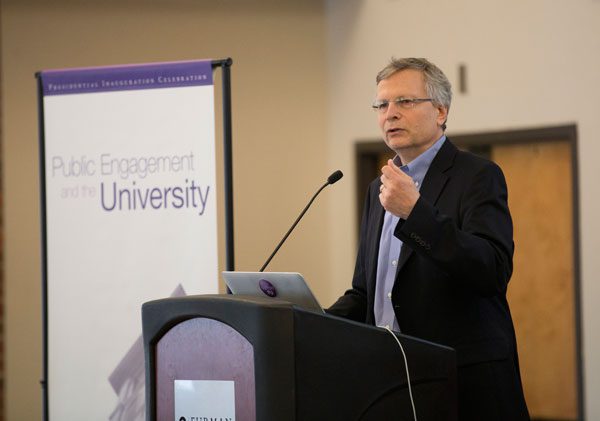Economics, ideas and interests

The role of ideas in political economics helps explain why a vested interest of an elite class is not always the explanation for issues such as the dual-track reforms in China in the 1970s and 1980s or the democratization in South Africa after Apartheid, said Dr. Dani Rodrik.
Rodrik, a renowned expert on political economy and economic development, spoke Tuesday on “Economics, Ideas and Interests” at the Marsh & McLennan American Enterprise Lecture at Furman University. The lecture this year is one of the activities commemorating the Inauguration of Dr. Elizabeth Davis, the twelfth president of Furman.
Nathan Cook, Ph.D., Furman associate professor of economics, introduced Rodrik as a “gadfly” known for his challenges of the status quo and economic consensus.
The role of ideas is absent in much of contemporary political economics, Rodrik said, as many give the vested interests of an elite class the dominant role in explaining economic and political policies. Those vested interests are seen as fixed and well defined.
But other ideas such as justice, fairness, and the common interest of citizens can keep the elite’s vested interests from being the sole idea that governs policy decisions, he said. The elite seldom argue solely that a policy is good for them personally or their industry. The other values such as the common good are used to advance those arguments.
“We live in a world where ideas can exert an independent influence” on policies, he said. Ideas can shape the objective being sought with a policy, the nature of cause and effect and how it is applied, the worldview behind the policies under consideration, and the tools that people think are available to them for use.
In today’s world the mapping of vested interest is no longer well defined, he said. For example, it is no longer possible to say that the auto industry will always favor trade protection. There may be strong reasons for them to favor free trade instead.
Rodrik set up a simple framework using elites and citizens to explain his belief that ideas other than vested interests play a part in the systems of political economics in the world. If the status quo is accepted, the elites benefit the most. But depending on the types of reforms, citizens could benefit as well as the elite class. And in other reform methods, the elites could lose power by losing the ability to redistribute wealth or power.
For an example if tax controls are removed, some people or classes will win and others will lose. In fact, the most powerful class could be worse off. For example, the Corn Laws in Britain during industrialization were desired by the manufacturing class but opposed by the landed gentry or elites, who often have a veto power on changes.
Price controls in China in the 1970s protected farmers by keeping prices high but hurt urban workers who had to pay higher prices for food. However, the government managed the problem by requiring farmers to sell a portion of their product to the state at a below-market price while allowing the sale of the remainder at market prices, he said. By selling the cheaper food products, the state could hold prices down for the urban workers.
The question arises, he said, of why the losers can’t be compensated when a reform is enacted. The problem is that transfer mechanisms may not be available or they may distort the economy. Promises to compensate the losers may not be credible because as a class weakens, it may be hard to enforce the compensation.
For example, some African economic elites refuse to accept urbanization although it would expand the overall pie, he said. Over time, however, it would erode the power of the elite class to control the economy.
When challenging the status quo in politics, citizens or challengers can use identity politics, worldview or how the policies work and policy innovation by expanding the set of feasible policies.
People and groups have multiple identities as part of a community, religion, nation, family, or profession. The importance of those various identities is fluid. Also, “the sense of self and identity can be affected by external factors,” something politicians often use. External factors can explain why the middle class in the United States does not always vote for policies that would be most beneficial for it economically, Rodrik said.
Another example is that the issue of minimum wage can be seen as reducing employment or not depending on whether a group’s economic worldview sees the economy as competitive or non-competitive.
Challenging the status quo with innovative policies often occurs during times of turmoil because “crises tend to be a laboratory for policy innovation,” he said. However, new policies also can be copied from other countries or political entrepreneurs or leaders can be the catalyst.
According to Rodrick, plenty of questions are open when it comes to the role of ideas in political economics, including who generates the idea, who disseminates the ideas, and whether good ideas will drive out bad ideas.And the general trend for more economists to engage in public writing is, on the whole, a good thing. But economists should not be divided into researchers, who don’t engage in the public debate, and applied economists who carry the ideas. Some overlap should occur.
The Albert O. Hirschmann Professor of Economics at the School of Social Science, Institute for Advanced Study, Rodrik is the recipient of the inaugural Albert O. Hirschman Prize of the Social Science Research Council and of the Leontief Award for Advancing the Frontiers of Economic Thought.
See the full schedule and get more information on the Inauguration Celebration Week events.